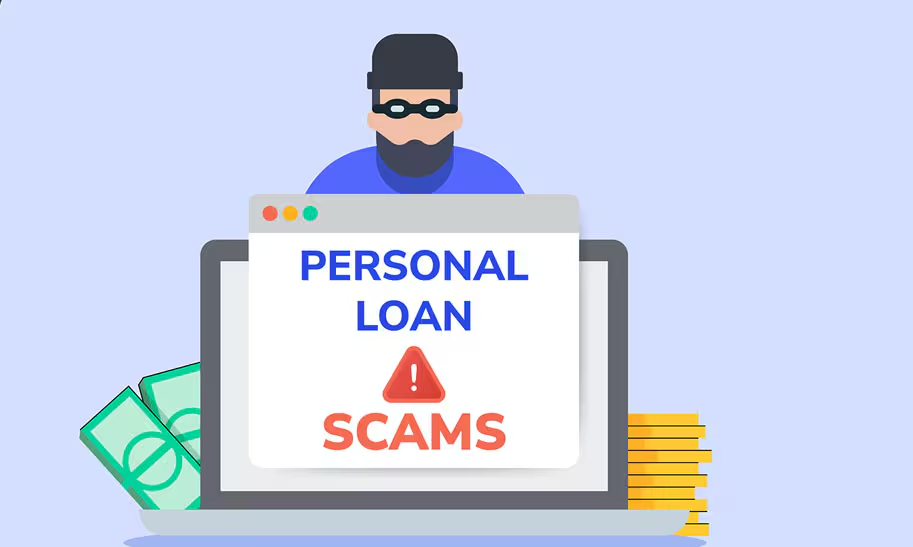Imagine this: You urgently need some quick cash, and an online personal loan ad pops up offering instant approval, no paperwork, and fast money in your account. Sounds like a dream, right?
Soon, someone claiming to be a “loan officer” calls you and says there’s just a small processing fee to get started. Hoping to solve your money worries, you pay it—only to find out later that the loan was never real. You’ve just been scammed.
Unfortunately, this kind of story is becoming more and more common.
What are personal loan scams?
These are fake loan offers designed to trick people—usually those who are urgently looking for money. Scammers pretend to be legit lenders and ask for fees or personal details, but they’re only after your money and information.
They set up convincing websites, send official-looking emails, and even run ads on social media. It can be really hard to tell the difference between a real offer and a scam.
Worse still, not only do you lose money, but these scams can also put your private information at risk, which can lead to identity theft.
But the good news? If you know what to watch out for, you can avoid falling into the trap.
Common Personal Loan Scams You Should Know About
Scammers are getting cleverer with how they trick people looking for quick loans. Knowing the warning signs can help you stay one step ahead. Here are some of the most common personal loan scams to watch out for:
1. Advance Fee Loan Scam
This is one of the oldest tricks in the book. You’re promised a fast, hassle-free loan—no questions asked—but there’s a catch: you need to pay a “processing” or “insurance” fee upfront. Once you pay, the so-called lender disappears, and you never see that money (or the loan) again.
2. No Credit Check Loan Scam
Real lenders always check your credit score before giving you a loan. Scammers, on the other hand, claim they don’t care about your credit—they’ll give you a loan anyway. It sounds great, especially if your credit score isn’t perfect. But these fake lenders either vanish after taking a fee or trap you in loans with ridiculously high interest rates.
3. Fake Calls from Banks or NBFCs
Sometimes scammers pretend to be calling from trusted banks or financial companies. They offer tempting loan deals, then ask for sensitive info like your Aadhaar number, PAN card, or OTPs. Once they have these details, they can pull off unauthorized transactions in your name.
4. Phishing Emails and Look-Alike Websites
Ever seen an email that looks like it’s from a real bank, complete with a fancy logo and urgent message? Be careful! These emails often link to fake websites that look just like the real ones. If you enter your personal info there, scammers can steal it.
5. Instant Loan App Scams
With so many loan apps available today, it’s tough to know which ones are safe. Some shady apps offer easy loans but ask for access to your contacts, messages, and photos. Even if you don’t take the loan, they might harass you—or worse, blackmail you using the data they collected.

How to Spot a Personal Loan Scam
If something feels off when you’re looking for a loan, it’s better to trust your gut. Here are some red flags that can help you spot a scam before it’s too late:
1. Upfront Payment Requests
Legitimate lenders don’t ask for money before giving you a loan. If you’re asked to pay a processing fee, GST, or a security deposit upfront, be wary—it’s likely a scam.
2. Too-Good-to-Be-True Loan Offers
Be careful if you come across offers promising loans with zero interest, no eligibility checks, or instant approval without any paperwork. These types of offers are usually too good to be true and often lead to scams.
3. No Physical Address or Contact Information
If the lender doesn’t provide a physical address or only contacts you via WhatsApp or email, something’s not right. Trustworthy lenders always have a registered office and proper contact details.
4. High-Pressure Sales Tactics
Scammers often try to rush you, claiming that the loan offer is limited or that you need to act quickly. Genuine lenders will give you time to review your options without pressure.
5. Unprofessional Communication
Watch out for emails with lots of grammar mistakes, strange sender addresses, or impersonal greetings like “Dear Customer.” These are signs of phishing scams that are trying to steal your personal details.
6. Asking for Sensitive Information
No legitimate lender will ask for sensitive details like your PAN, Aadhaar number, bank login credentials, or OTPs over the phone or in a text. If someone does, it’s a big red flag.





